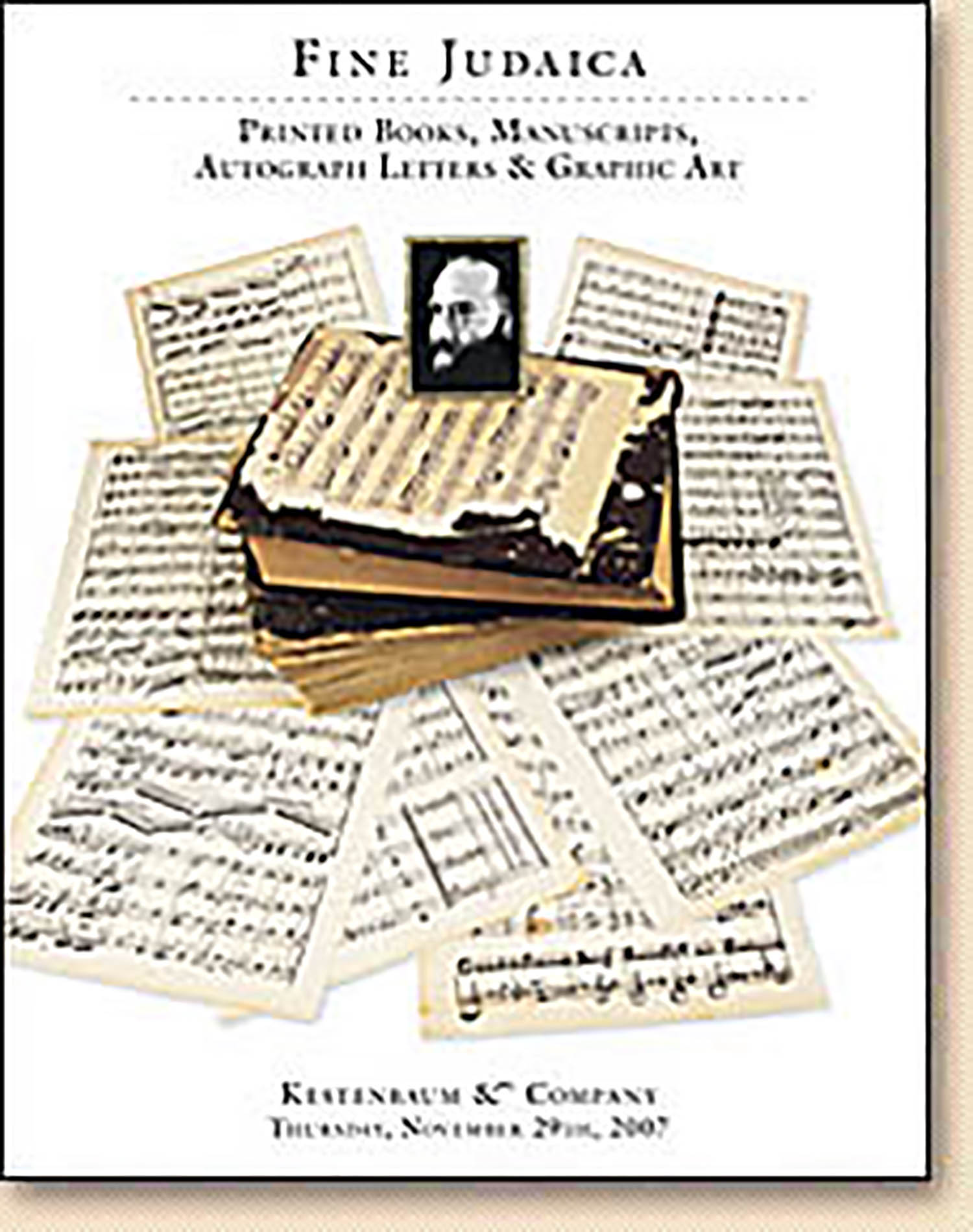Signed postcard addressed to Prof. Richard Gottheil, Columbia University, New York

AUCTION 38 |
Thursday, November 29th,
2007 at 1:00
Fine Judaica: Printed Books, Manuscripts, Autograph Letters & Graphic Art
Lot 287
HERZL, THEODOR
Signed postcard addressed to Prof. Richard Gottheil, Columbia University, New York
Constantinople: 20th May, 1901
Est: $4,000 - $6,000
PRICE REALIZED $2,000
HISTORIC POSTCARD.
Written by: Theodor Herzl (1860-1904), father of political Zionism. * Oskar Marmorek (1863-1909), Viennese Jewish architect, elected by the First Zionist Congress in Basel to the Inner Actions Committee. In later years, Marmorek was prominent in the affairs of the Jewish community of Vienna. * David Wolffsohn (1856-1914), a native of Lithuania, the traveling companion of Herzl on his journeys to Eretz Israel (1898) and Turkey. After Herzl’s untimely death in 1904, Wolffsohn succeeded him as second president of the World Zionist Organization.
The recipient, Prof. Richard Gottheil (1862-1936), was Professor of Semitic languages at Columbia University, and president of the American Zionist Federation from 1898 to 1904.
Background:
On May 17th, 1901, Theodor Herzl was received by the Sultan in Constantinople. This postcard, datelined three days later, was clearly written under the impact of that historic meeting. The "highest morale," perhaps even state of euphoria, to which Marmorek alludes in this postcard, is testimony to the high hopes the trio pinned upon the newly opened diplomatic channel to the Sultanate.
Though it has been said that Herzl made a strong impression upon the ruler of the Ottoman Empire (of which Palestine was a satrapy), ultimately nothing concrete came of the negotiations with the Turkish government. After more unsuccessful meetings with the Sublime Porte, in February 1902 and again in July 1902, Herzl finally despaired of making any headway with the Ottomans and sought results elsewhere - famously, in Great Britain.
David Wolffsohn and Oskar Marmorek accompanied Herzl on his mission to Constantinople, but only Herzl was received by the Sultan. Herzl offered Sultan Abdul Hamid II a way to lessen the public debt of Turkey through his connections with prominent Jewish financiers. In return, the Sultan was to make a public proclamation expressing his gratitude to the Jewish People - afterwhich, through the intermediacy of 2nd Secretary Izzet, would Herzl propose to the Sultan his concept of "the Charter" (i.e. a Land Company for Palestine) leading to formal Jewish settlement in Palestine.
The audience with the Sultan on Friday, May 17th, lasted two hours, after which Herzl was thoroughly exhausted. As a token, the Sultan bestowed on Dr. Herzl the Grand Cordon of the Mejidiye Order. (As Herzl pointed out in his diary, the previous visitor to the Sultan, a Russian military man received this identical token honor.)
If the Sultan found Herzl impressive, the compliment was not returned. Herzl, as many others, found Sultan Abdul Hamid II a pathetic figure. Indeed in his diary, Herzl toyed with the idea of writing a tragicomedy concerning the Sultan and his coterie.
Herzl gained access to the Sultan through the colorful Prof. Arminius Vámbéry (1832-1913). Vámbéry was a Hungarian Jewish Orientalist and traveler. Raised in the traditional Orthodox manner, in 1857 Vámbéry traveled to Constantinople, where he eventually became a secretary of Fuad Pasha, converting to Islam in the process. Later, back in Budapest, Vámbéry adopted Protestantism, whereby he was appointed Professor of Oriental Languages at the University. In his frequent travels to Turkey and England, Vámbéry carried out many sensitive diplomatic missions, befriending along the way both Sultan Abdul Hamid II and King Edward VII.
See R. Patai ed., H. Zohn trans., The Complete Diaries of Theodor Herzl (1960), pp. 1101-1138 (especially pp.1110-1120 for the actual audience of May 17)
